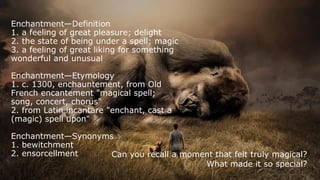On Felski (2008): An Enchanting Discussion
- 1. Felski (2008) on Enchantment Olivier Serrat September 2024
- 2. EnchantmentŌĆöDefinition 1. a feeling of great pleasure; delight 2. the state of being under a spell; magic 3. a feeling of great liking for something wonderful and unusual EnchantmentŌĆöEtymology 1. c. 1300, enchauntement, from Old French encantement "magical spell; song, concert, chorus" 2. from Latin incantare "enchant, cast a (magic) spell upon" EnchantmentŌĆöSynonyms 1. bewitchment 2. ensorcellment Can you recall a moment that felt truly magical? What made it so special?
- 3. Enter: Felski (2008) Felski (2008) challenged the tendency to view literature through the lens of suspicion, born of the Frankfurt School. Felski (2008) emphasized the importance of acknowledging the pleasure and transformative potential that literature offers. "Enchantment is a term with precious little currency in literary theory, calling up scenarios of old-school professors swooning in rapture over the delights of Romantic poetry" (Felski, 2008, p. 54) Can you say a few words about the Frankfurt School?
- 4. Felski (2008) introduced four "modes of textual engagement" (p. 14), intended as different ways to think about why we read literature: recognition, enchantment, knowledge, and shock. Each mode is the subject of a chapter. In the chapter on enchantment in Uses of Literature (2008), Felski (2008) delved into the captivating power of literature.
- 5. Is enchantment escapism? According to Felski (2008), enchantment is about the profound impact that stories can have on our perception of reality. "Enchantment is characterized by a state of intense involvement, a sense of being so entirely caught up in an aesthetic object that nothing else seems to matter" (Felski, 2008, p. 54) In Felski's (2008) analysis of Gustave Flaubert's Madame Bovary (1857/1965), Emma's visit to the opera house reignites her romantic fantasies and heightens her discontent with her ordinary life (p. 53).
- 6. In short, Felski (2008) argued that enchantment is a vital mode of textual engagement, whereby readers experience a sense of wonder and immersion in the text. Enchantment allows readers to be transported into different worlds, feeling a deep connection with and emotional response to the narrative. Challenging critical suspicion, reading as aesthetic experience, enchantment as immersion, emotional and intellectual engagement ŌĆ” Have you detected other themes in Felski's (2008) treatment of enchantment?
- 7. Why did Felski select recognition, enchantment, knowledge, and shock as her "modes of textual engagement"?
- 8. Introducing other "modes of textual engagement" could provide a more nuanced understanding of how readers interact with literature. Other modes might include the comic, the grotesque, the pastoral, the picturesque, the tragic, the ugly ŌĆ” Other "modes of textual engagement" might dilute the clarity and focus of Felski (2008) but would open avenues for research in aesthetic theory, comparative literature, digital humanities, genre studies, interdisciplinary studies, pedagogical approaches, and reader-response theory (Serrat, 2024). What do you think? Felski (2008) clarified that her "modes of textual engagement" are neither all-encompassing nor mutually exclusive: they only highlight strands of aesthetic response she considered were frequently intertwined.
- 9. References https://www.researchgate.net/publication/384079872_Recognition_Enchantment_Knowledge_and_Shock_A_Response_to_Felski's_2008_Literary_Phenomenology https://www.researchgate.net/publication/384079872_Recognition_Enchantment_Knowledge_and_Shock_A_Response_to_Felski's_2008_Literary_Phenomenology https://www.researchgate.net/publication/384079872_Recognition_Enchantment_Knowledge_and_Shock_A_Response_to_Felski's_2008_Literary_Phenomenology Felski, R. (2008). Uses of literature. Blackwell Publishing. Flaubert, G. (1965). Madame Bovary. W. W. Norton & Company. (Original work published 1857) Serrat, O. (2024). Recognition, enchantment, knowledge, and shock: A response to Felski's (2008) literary phenomenology. Unpublished manuscript, Georgetown University. https://www.researchgate.net/publication/384079872_Recognition _Enchantment_Knowledge_and_Shock_A_Response_to_Felski's_2 008_Literary_Phenomenology
- 10. Quick Response Codes @Academia.edu @Google Scholar @LinkedIn @ResearchGate @║▌║▌▀ŻShare @Twitter










